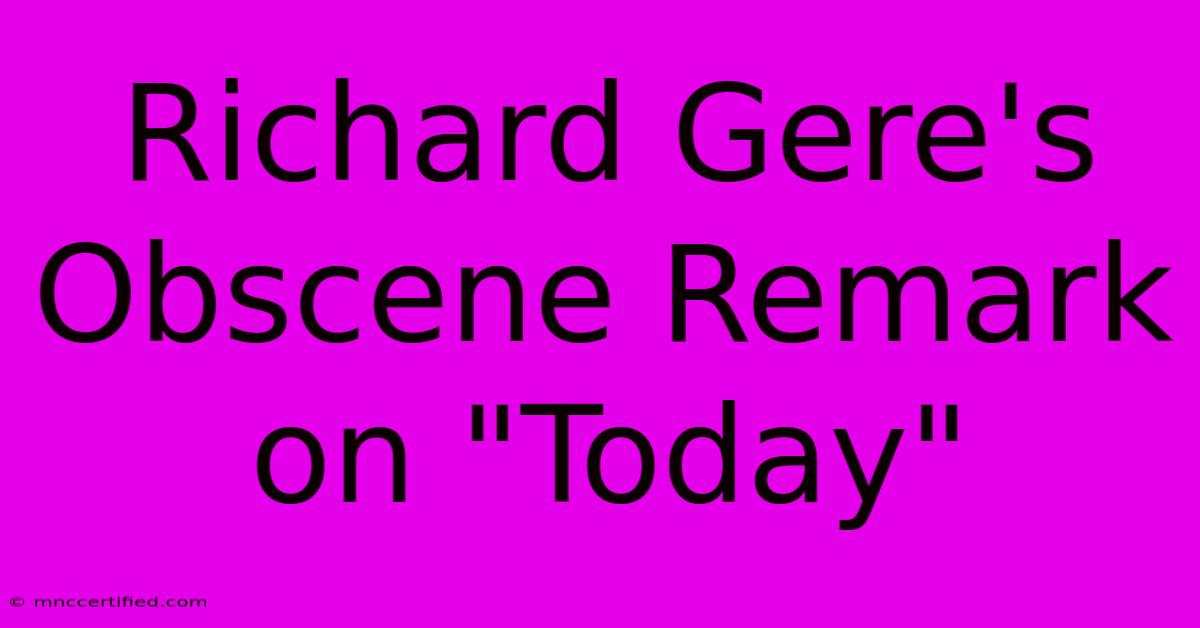Richard Gere's Obscene Remark On "Today"

Table of Contents
Richard Gere's "Today" Show Controversy: A Deep Dive into the Obscene Remark and its Aftermath
Richard Gere, a Hollywood icon known for his roles in films like Pretty Woman and An Officer and a Gentleman, recently found himself embroiled in controversy following an appearance on the popular morning show, "Today." While the specifics of the incident remain somewhat opaque, depending on the source and interpretation, the core issue revolves around a remark deemed by many as obscene, leading to widespread discussion and debate. This article delves into the incident, analyzing the context, the public reaction, and its broader implications.
The Alleged Obscene Remark: What Happened on "Today"?
Unfortunately, precise details about the exact nature of Richard Gere's remark remain scarce in widely accessible, verifiable information. Many news sources allude to an off-color comment or a joke that crossed a line, deemed inappropriate for the daytime television audience of "Today." The lack of a readily available transcript or widely circulated video clip adds to the mystery, fueling speculation and different interpretations of the event. This ambiguity itself highlights a crucial aspect of the controversy: the power of interpretation and the role of context in shaping public opinion.
The Importance of Context and Verification
The absence of definitive information underscores the need for critical media consumption. Before accepting any single account of the incident as definitive truth, it is crucial to verify information across multiple credible sources. Relying on hearsay or biased reporting can lead to misinformation and inaccurate conclusions. A responsible approach requires evaluating the credibility of the source, considering potential biases, and seeking out corroborating evidence before forming an opinion.
Public Reaction and Media Coverage: A Rollercoaster of Opinions
The reported incident sparked a whirlwind of reactions across social media and traditional news outlets. While some defended Gere, suggesting the comment was taken out of context or that the criticism was overly sensitive, others condemned the remark as inappropriate and unprofessional. The intensity of the response speaks volumes about societal standards of decency and the scrutiny placed upon public figures, particularly in the context of family-friendly television programming.
The Double-Edged Sword of Social Media
Social media amplified the controversy, providing a platform for immediate and widespread reactions. While this allows for swift dissemination of information, it also facilitates the spread of misinformation and fuels polarized opinions. The lack of a singular, verified account of the event further complicated the situation, with conflicting narratives and opinions circulating rapidly.
Implications and Lasting Impact: Beyond the Immediate Headlines
Beyond the immediate furor, the incident raises important questions about boundaries in public discourse, the changing landscape of media consumption, and the challenges of maintaining a public image in the age of social media. The impact on Richard Gere's career remains to be seen, but the controversy serves as a reminder of the potential consequences of public statements, even those seemingly innocuous in private settings.
Navigating the Public Image in the Digital Age
The Richard Gere "Today" Show incident highlights the difficulties faced by public figures in maintaining a positive public image in the digital age. The speed and reach of social media make it increasingly challenging to control narratives and manage potential controversies effectively. This emphasizes the need for careful consideration of public statements and engagement with audiences.
Conclusion: The Need for Responsible Reporting and Critical Engagement
The controversy surrounding Richard Gere's alleged obscene remark on "Today" underscores the importance of responsible reporting, critical media consumption, and careful consideration of context. The lack of readily available, verified information surrounding the event highlights the need for due diligence before forming opinions and the potential for misinformation to spread rapidly. The incident also serves as a reminder of the profound impact of public statements in the digital age and the ever-evolving landscape of acceptable public discourse. Ultimately, until verified information is available, the incident remains a case study in the complexities of public perception and the challenges of navigating the modern media landscape.

Thank you for visiting our website wich cover about Richard Gere's Obscene Remark On "Today". We hope the information provided has been useful to you. Feel free to contact us if you have any questions or need further assistance. See you next time and dont miss to bookmark.
Featured Posts
-
31 20 An Hour Is How Much A Year
Nov 21, 2024
-
Georgia Nursing Student Murder Guilty Verdict
Nov 21, 2024
-
Responsible Innovation At Penn
Nov 21, 2024
-
6 05 Volume And Figures Activity
Nov 21, 2024
-
Chad Michael Murrays Netflix Christmas Role
Nov 21, 2024